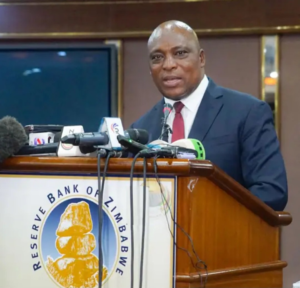DIGITAL GOLD COINS AND ZIMBABWE’S REVISITATION OF THE 2008 BEARER CHEQUE ERA: AN INDICTMENT OF ZANU-PF LEADERSHIP
As Zimbabwe’s economy continues to grapple with the shocks of a tumultuous history, the Reserve Bank of Zimbabwe (RBZ) is seemingly taking the country back to the bleak era of 2008 with the recent introduction of digital gold coins. It is a move that appears eerily reminiscent of the bearer cheque era, a period marked by hyperinflation and extreme economic hardship. The unfolding scenario painfully underscores the failed leadership of ZANU-PF, whose economic mismanagement has been the root cause of the country’s perennial crises.

In 2008, the RBZ, in a desperate attempt to salvage a collapsing economy, introduced bearer cheques as a form of legal tender. This experiment proved disastrous as Zimbabwe’s inflation rate skyrocketed to a staggering 89.7 sextillion per cent per month by November 2008. It is a period Zimbabweans remember with dread, defined by empty shop shelves, long queues for basic commodities and an utterly worthless currency.
Fast forward to 2023, and Zimbabwe seems to be on a familiar and perilous path with the introduction of digital gold coins. Although it is touted as an innovative measure to stabilise the economy and offer protection against inflation, the digital gold coin initiative is fraught with potential pitfalls that could plunge the country into another cycle of economic hardship.
Digital gold coins, while theoretically providing a digital representation of gold, are essentially a form of cryptocurrency. They are subject to the same vulnerabilities as other digital currencies, including cybercrime, price volatility, and regulatory challenges. There’s also the issue of accessibility. In a country where a significant proportion of the population is unbanked and lacks reliable internet access, the move towards digital currencies seems ill-considered and out of touch with the reality on the ground.
Furthermore, the gold backing these coins comes from Zimbabwe’s own reserves, which are already under strain. Should the scheme fail, it is likely to exacerbate the country’s financial woes, echoing the ruinous effects of the 2008 bearer cheque era.
The introduction of digital gold coins is indicative of the ZANU-PF’s leadership failure. The party, which has been in power since the country’s independence, has been blamed for the economic instability that has characterised Zimbabwe for decades. The digital gold coin initiative seems more like a desperate manoeuvre rather than a well-thought-out, sustainable economic policy.
The ZANU-PF leadership’s inability to address rampant corruption, implement effective economic reforms, and ensure sound fiscal management has led to a series of financial crises. It’s a cycle that is all too familiar to the average Zimbabwean – crisis, response, temporary relief, followed by another crisis.
The introduction of digital gold coins, as with the bearer cheques, represents an attempt at a quick fix to deep-seated, systemic issues that require comprehensive and long-term solutions. Zimbabwe’s economy needs fundamental structural reforms, not stop-gap measures that only serve to exacerbate the situation.
It is incumbent on the ZANU-PF leadership to take a hard look at the current economic policies and their effects on the nation. They must acknowledge past failures and implement sound and sustainable strategies to stabilise the economy, rather than resorting to experiments that may drag the nation back to the dark days of hyperinflation and economic instability.
It is high time for the ZANU-PF leadership to stop using the country as a testing ground for risky financial experiments. The people of Zimbabwe deserve leadership that will strive for economic stability, sound fiscal management, and policies that are grounded in a realistic understanding of the nation’s capabilities and needs. It’s time to break the cycle and step






